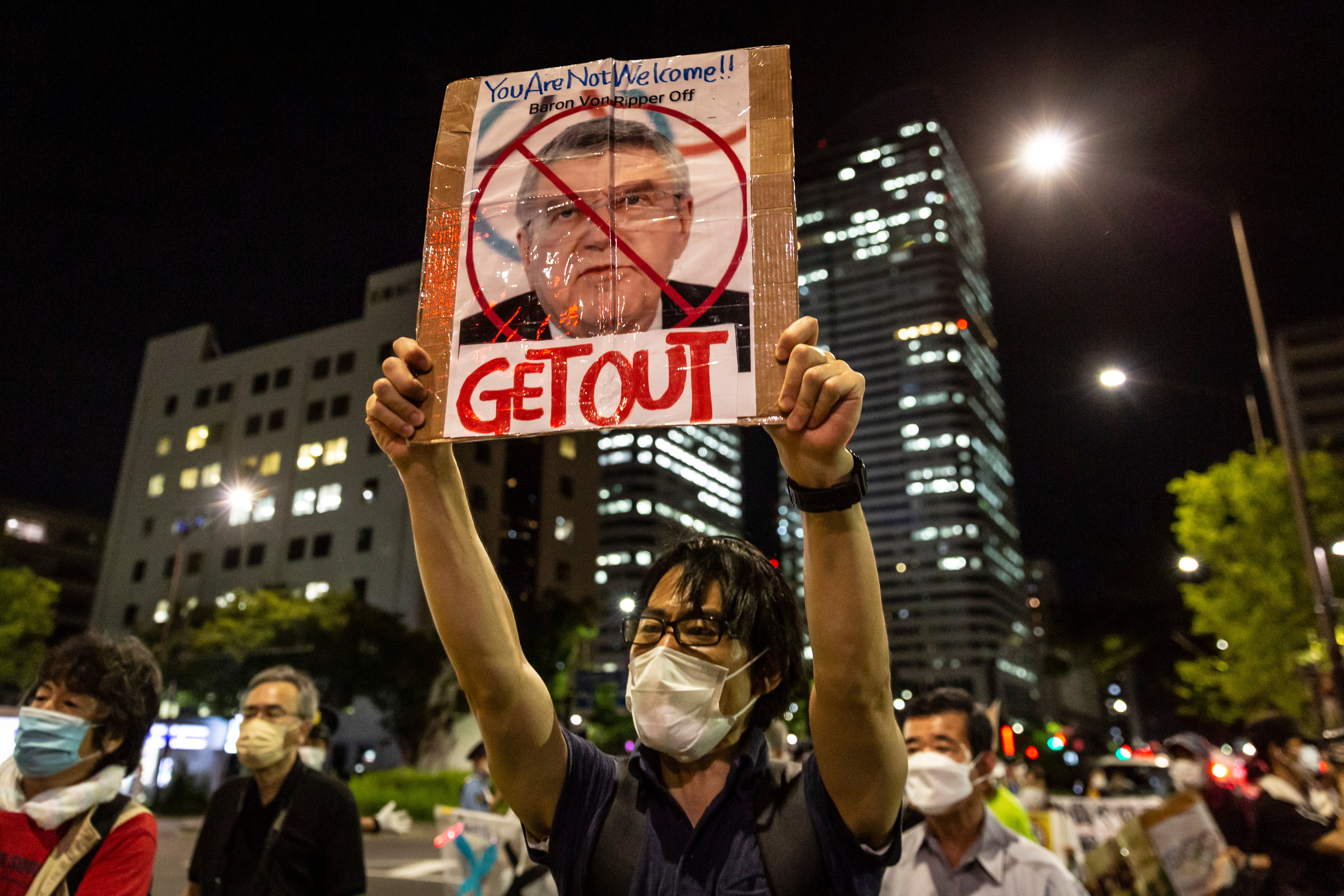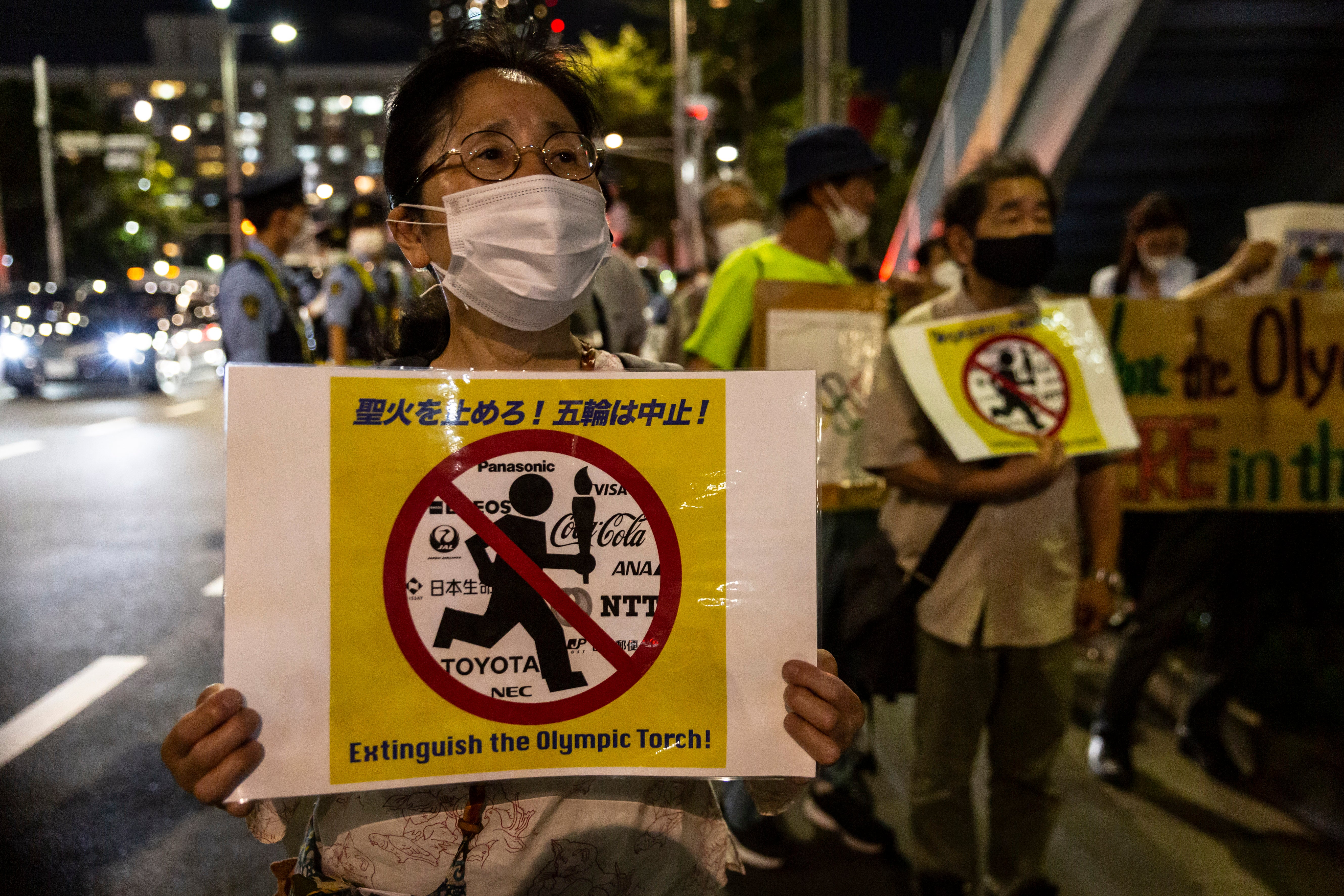The unwanted games: Japan warned it could face double the number of Covid infections by end of the Olympics
As coronavirus rates increase a week ahead of the Olympics, critics claim the Japanese government has its priorities wrong, reports William Yang


With just a week until the start of the summer Olympics in Japan, Tokyo has entered another coronavirus-induced state of emergency amid fears cases could double in the host city by the end of the controversial games.
Infections hit a six-month high on Thursday, the second day in a row on which Tokyo has recorded more than 1,000 cases in a single day.
According to Kyodo News, health experts advising the Tokyo metropolitan government said the moving average of infections could increase to 2,406 a day by 11 August if the virus continues to spread at the same pace.
The games start on 23 July and continue until 8 August.
On Friday, Japanese prime minister Yoshihide Suga said he had instructed cabinet members to do their best to fulfil virus-containment procedures. According to Mr Suga, measures including Covid-19 tests and location tracking will be deployed as tens of thousands of foreign athletes and officials arrive in Japan for the games.
Olympic organisers have already adopted stringent measures to prevent the virus from further spreading during one of the biggest sporting events in the world. Spectators will be banned from most venues, and only a few hundred government officials and athletes will be attending the opening ceremony.
Other rules to prevent the further exacerbation of the current Covid-19 outbreak have also been laid out in the “playbooks” issued by the organisers and the Tokyo metropolitan government. Some of these include wearing masks at all times, a ban on using public transport, and sticking to the activities outlined in athletes’ activity plans.
Despite these stringent measures, experts think the situation in Tokyo presents a risky environment in which to hold an event like the Olympics. Siddharth Sridhar, a clinical virologist at the University of Hong Kong, says that since the Delta variant has already caused an active outbreak in Tokyo, athletes, supporting staff, and even spectators are at risk in such an environment.
“The IOC (International Olympic Committee) has assured the public that it’s going to be a safe and secure competition, but the reality is the virus is very clever at seeking loopholes for causing outbreaks,” he told The Independent. “There is definitely a risk of transmission between the local population and the athletes, or vice versa.”

And while the organisers have rolled out a playbook instructing athletes to follow certain protocols amid Tokyo’s state of emergency, Sridhar says there are still human factors that might make it hard to maintain the bubble throughout the Olympics.
“People on either side of the bubble might break the rules, either knowingly or unknowingly, and there might be situations where everyone is following the rules but the virus is still transmitted through the airborne route,” he explained.
“There is also the risk of athletes getting infected during this event, and they might take the virus back to their home countries. There might be areas that may not have a lot of Delta cases now suddenly having a lot of Delta cases from Japan. It’s a difficult time to be holding the Olympics,” he said.
The domestic Covid-19 outbreak has not only increased concerns about the Olympics: it has also hurt Japanese prime minister Suga’s approval rating. According to a survey conducted by Japan’s public broadcaster NHK this week, approval for his cabinet has fallen to 33 per cent, an all-time low, while the disapproval rating has reached an all-time high.
The big worry is if the Olympics are a superspreader event, the Japanese public healthcare system would be overwhelmed
Regarding the government’s handling of the Covid-19 pandemic, more than half of respondents in the survey said Suga wasn’t doing very well. Additionally, fewer than 40 per cent of respondents thought the new coronavirus state of emergency would be effective. In comparison, 56 per cent of respondents believed the measures would be ineffective at bringing down the number of new cases.
Jeff Kingston, director of Asian studies at Temple University’s Japan campus, said the Japanese government’s image had been damaged over the last few months by the chaotic rollout of Covid-19 vaccines and its keenness to host the Olympics.
“People are looking at this incompetent government, and Suga’s approval rating has dropped like a rock,” he said. “The public here is not enthusiastic about the Olympics and they are really concerned that it will be a superspreader event.”
Kingston points out that while hosting the Olympics is supposed to be a chance for Japan to showcase its strengths, recent news coming out of Japan has been about incompetence at the top and a public healthcare system that’s about to be swamped.

“The big worry is if the Olympics are a superspreader event, the Japanese public healthcare system would be overwhelmed,” said Kingston. “Public health has also seemed to take a back seat to economic and political priorities. Overall, the Olympics seem to be all about materialism and political calculations.”
The government’s decision to push ahead with the summer Olympics amid the ongoing Covid-19 pandemic has also created some political setbacks for the ruling Liberal Democratic Party (LDP). Earlier this month, the party and its ally, Komeito, failed to win a majority in Tokyo’s metropolitan assembly election.
With the elections for the LDP’s presidency and Japan’s House of Representatives scheduled to take place this autumn, experts think the timing of the Olympics is giving Prime Minister Suga no room for error.
“The elections are problems for Suga,” said Corey Wallace, an assistant professor at Japan’s Kanagawa University. “He has no room for error and he is on the ropes right now in terms of his ability to win in the party presidential race, which really decides who is the Japanese prime minister, given LDP’s dominance in parliament.”
Join our commenting forum
Join thought-provoking conversations, follow other Independent readers and see their replies
Comments